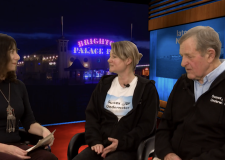Brighton MEP accuses police of using excessive force on Balcombe fracking protesters
One of the MEPs who represents Brighton and Hove, Keith Taylor, has written to Sussex Police accusing officers are using excessive force on peaceful protesters.
A senior officer defended police, saying that pictures of the arrests looked dramatic but did not show how long officers had spent trying to persuade the protesters against fracking to move.
He said that officers had to balance the rights of protesters with those of the workers at the Cuadrilla test site in Balcombe.
And he added that it was sometimes necessary to use force when talking failed to achieve the police’s objectives.
Mr Taylor said in a letter to Martin Richards, the Chief Constable of Sussex: “Given the peaceful nature of the protest I was concerned to hear reports from both my own staff and others that your officers seemed to be using excessive force against protesters last week.
“Specifically I was concerned to see video and photographic evidence showing officers apparently using pressure point techniques against some protesters who had locked arms on the side road leading to Cuadrilla’s drilling area.
“The officers appear to be using their hands to apply pressure on or near the protesters ears. I believe this is the mandibular angle technique.
“The use of this kind of force seems to me to be excessive given the peaceful nature of the protest and could run the risk of exacerbating tension between protesters and police.”
Mr Taylor is a Green Member of the European Parliament (MEP) for the South East England constituency. He used to be a councillor on Brighton and Hove City Council.
He went to the protest site on Sunday (28 July) to show his support for the opponents of fracking with three current members of the council, Councillors Phélim Mac Cafferty, Alex Phillips and Mike Jones.
Superintendent Steve Whitton said: “We understand how strongly some people feel about the issue of fracking but it is important that they work with us to protest safely and peacefully.
“It is a difficult balance for police to support an absolute legitimate right for people to protest peacefully and also uphold the legal right of the company to operate.
“We will do all we can to keep that balance right.
“Our primary tactic is to talk to people and officers are going to great lengths to explain to people why we are there and what is acceptable in terms of their safety and others working at the location.
“When we police these kinds of demonstrations we will always look for a negotiated response.
“We would much rather talk to people and persuade them to move than use coercion.
“Some pictures in the media look dramatic. What they often don’t show is the length officers have gone to persuade protestors to move.
“If protestors block the way and it is lawful for the company to operate then they need to move.
“If they are repeatedly asked to move, and at times are putting their own safety at risk, some level of coercion has to be used.
“There are a range of tactics that officers are trained to use and the use of pressure points is one that is proportionate and uses the minimum of force necessary.
“When you have a protest of this nature you need to get the balance right.
“We look to resource it at the lowest level that will be effective and that is a complex thing to judge.
“We do not want to waste resources but equally safety of the protesters and protecting people’s rights are a priority.
“This operation has put a strain on police resources.
“It does mean that we have postponed some proactive work but it will not affect any calls for assistance.
“We are continually reviewing the policing operation, working with the protesters, the community and the company to ensure any ongoing policing commitment is appropriate.
“Some people have asked how much the policing operation has cost but we don’t have the cost at this time and it is changing every day.
“We will be transparent when we are in a position to do so.”























